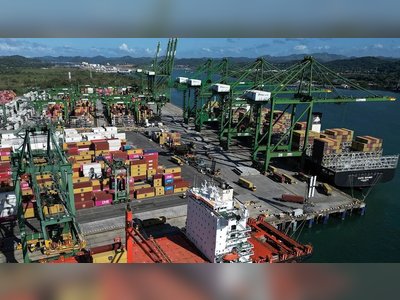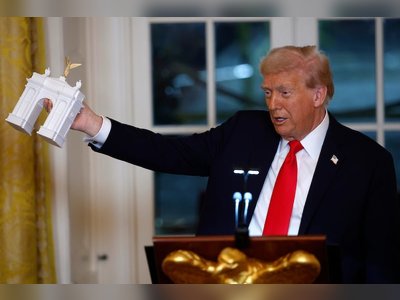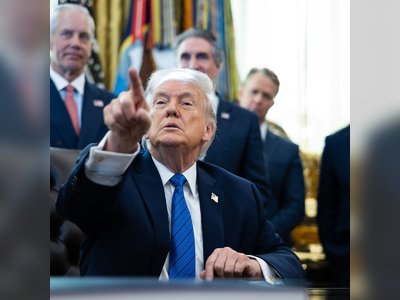0:00
0:00
State-backed Chinese technology firms are intensifying efforts to recruit Western engineers, offering salaries up to three times their current pay
The strategy, which targets critical industries like artificial intelligence and semiconductors, is sparking debates over fairness, security, and the evolving dynamics of global competition—but it mirrors what the U.S. has been doing for decades, leaving Europe, India, and Israel with little startup success, if at all, as their top talent is consistently drawn to American money.
According to reports, companies such as Huawei have approached employees at firms like ASML in the Netherlands and Zeiss SMT in Germany, some of the most advanced producers of semiconductor technology. These efforts often involve direct messages on LinkedIn, emails, and even phone calls. While such moves may appear as typical headhunting, Western officials and industry leaders argue that they represent a calculated strategy to siphon off expertise in vital technological fields.
Fair Game or Strategic Threat?
The controversy centers on whether these aggressive recruitment tactics constitute legitimate competition or a breach of ethical and economic boundaries. Critics argue that China’s approach, backed by significant state funding, undermines the principles of fair competition. Taiwanese authorities have investigated 90 cases of alleged worker theft between 2020 and mid-2024, and similar concerns have been raised in Europe.
“This isn’t just about talent migration—it’s about strategically dismantling rival industries,” said a senior executive at a European chip manufacturer, speaking on condition of anonymity. “If these engineers take sensitive knowledge with them, it’s not just a business loss—it’s a national security issue.”
Chinese companies have reportedly used shell firms and local partnerships to mask their origins, circumventing scrutiny and easing recruitment efforts. In some cases, entire teams have been targeted, raising alarms among intelligence agencies in Germany and Taiwan.
A Double Standard?
While many in the West view these actions as unfair, others argue that they are merely a reflection of the playbook the United States has used for decades. Silicon Valley’s dominance, critics note, is built on decades of attracting the world’s top talent, particularly from Europe, India, and China. Scientists and engineers who immigrate to the U.S. often bring cutting-edge knowledge and innovations with them, leaving their home countries at a competitive disadvantage.
“Let’s not pretend this is entirely new,” said an economist specializing in global trade. “The U.S. has been luring talent from abroad with higher salaries and better opportunities for years. Europe, for example, struggles to retain its best minds because so many of them move to the U.S. to work for American tech giants. Is what China is doing really so different?”
Proponents of this view point out that U.S. companies may appear private, but they are often indirectly funded by state mechanisms. Massive credit lines extended by American banks—enabled by government-backed liquidity and Federal Reserve policies—help sustain Silicon Valley’s ability to offer competitive compensation packages. This dynamic, they argue, is a form of state support, albeit less explicit than China's direct funding of its tech sector.
Security and Sovereignty at Stake
However, the stakes extend beyond economics. The fields being targeted—AI and semiconductors—are critical not only to technological innovation but also to national security. Companies like ASML, which produce advanced chip-making machines, are essential for the development of artificial intelligence and advanced military systems. Western officials warn that knowledge transferred to Chinese firms could have far-reaching geopolitical implications.
“The challenge isn’t just about salaries; it’s about safeguarding intellectual property and maintaining control over technologies that shape global power,” said a senior European Union official.
For countries like Taiwan, which sits at the heart of the global semiconductor supply chain, the risks are particularly acute. Taiwanese authorities recently accused eight Chinese firms of illegally poaching talent, actions they claim undermine the country’s competitiveness and security.
The West’s Role in the Talent Migration
Critics of Western policy argue that while China’s tactics may be aggressive, the West shares some responsibility for the situation. Decades of underinvestment in talent retention and an overreliance on outsourcing have made Western firms vulnerable to poaching. Engineers at firms like Zeiss SMT and ASML, while working on cutting-edge technologies, often earn salaries that pale in comparison to what Chinese firms are willing to offer.
“Western companies have taken their workers for granted,” said a Silicon Valley-based recruiter. “If you’re an engineer and someone offers you triple your salary, why wouldn’t you at least consider it?”
At the same time, some engineers have reportedly declined these offers, citing concerns about adapting to Chinese corporate culture or potential reputational risks. Nevertheless, the sheer scale of China’s recruitment efforts—dubbed the “spray and pray” approach by some—has proven effective in luring talent, even if only a small percentage accept.
A Crossroads for Global Competition
The debate underscores the complex dynamics of globalization. While Western governments and companies decry China’s tactics, they must also confront their own vulnerabilities. The West has long benefited from a global talent pipeline, attracting the best and brightest through opportunities, freedoms, and competitive compensation. However, as China ramps up its efforts, the West faces a dual challenge: retaining its edge in innovation while protecting its industries from strategic exploitation.
The question now is how to strike a balance. Should governments impose stricter policies to prevent intellectual property loss? Should companies focus on improving salaries and working conditions to retain their workforce? Or is this simply the cost of competing in an increasingly interconnected world?
What is clear is that this issue is not just about salaries or jobs—it is about the future of technological leadership and global power. As the race for dominance in AI and semiconductors heats up, the stakes for both sides have never been higher.
Fair Game or Strategic Threat?
The controversy centers on whether these aggressive recruitment tactics constitute legitimate competition or a breach of ethical and economic boundaries. Critics argue that China’s approach, backed by significant state funding, undermines the principles of fair competition. Taiwanese authorities have investigated 90 cases of alleged worker theft between 2020 and mid-2024, and similar concerns have been raised in Europe.
“This isn’t just about talent migration—it’s about strategically dismantling rival industries,” said a senior executive at a European chip manufacturer, speaking on condition of anonymity. “If these engineers take sensitive knowledge with them, it’s not just a business loss—it’s a national security issue.”
Chinese companies have reportedly used shell firms and local partnerships to mask their origins, circumventing scrutiny and easing recruitment efforts. In some cases, entire teams have been targeted, raising alarms among intelligence agencies in Germany and Taiwan.
A Double Standard?
While many in the West view these actions as unfair, others argue that they are merely a reflection of the playbook the United States has used for decades. Silicon Valley’s dominance, critics note, is built on decades of attracting the world’s top talent, particularly from Europe, India, and China. Scientists and engineers who immigrate to the U.S. often bring cutting-edge knowledge and innovations with them, leaving their home countries at a competitive disadvantage.
“Let’s not pretend this is entirely new,” said an economist specializing in global trade. “The U.S. has been luring talent from abroad with higher salaries and better opportunities for years. Europe, for example, struggles to retain its best minds because so many of them move to the U.S. to work for American tech giants. Is what China is doing really so different?”
Proponents of this view point out that U.S. companies may appear private, but they are often indirectly funded by state mechanisms. Massive credit lines extended by American banks—enabled by government-backed liquidity and Federal Reserve policies—help sustain Silicon Valley’s ability to offer competitive compensation packages. This dynamic, they argue, is a form of state support, albeit less explicit than China's direct funding of its tech sector.
Security and Sovereignty at Stake
However, the stakes extend beyond economics. The fields being targeted—AI and semiconductors—are critical not only to technological innovation but also to national security. Companies like ASML, which produce advanced chip-making machines, are essential for the development of artificial intelligence and advanced military systems. Western officials warn that knowledge transferred to Chinese firms could have far-reaching geopolitical implications.
“The challenge isn’t just about salaries; it’s about safeguarding intellectual property and maintaining control over technologies that shape global power,” said a senior European Union official.
For countries like Taiwan, which sits at the heart of the global semiconductor supply chain, the risks are particularly acute. Taiwanese authorities recently accused eight Chinese firms of illegally poaching talent, actions they claim undermine the country’s competitiveness and security.
The West’s Role in the Talent Migration
Critics of Western policy argue that while China’s tactics may be aggressive, the West shares some responsibility for the situation. Decades of underinvestment in talent retention and an overreliance on outsourcing have made Western firms vulnerable to poaching. Engineers at firms like Zeiss SMT and ASML, while working on cutting-edge technologies, often earn salaries that pale in comparison to what Chinese firms are willing to offer.
“Western companies have taken their workers for granted,” said a Silicon Valley-based recruiter. “If you’re an engineer and someone offers you triple your salary, why wouldn’t you at least consider it?”
At the same time, some engineers have reportedly declined these offers, citing concerns about adapting to Chinese corporate culture or potential reputational risks. Nevertheless, the sheer scale of China’s recruitment efforts—dubbed the “spray and pray” approach by some—has proven effective in luring talent, even if only a small percentage accept.
A Crossroads for Global Competition
The debate underscores the complex dynamics of globalization. While Western governments and companies decry China’s tactics, they must also confront their own vulnerabilities. The West has long benefited from a global talent pipeline, attracting the best and brightest through opportunities, freedoms, and competitive compensation. However, as China ramps up its efforts, the West faces a dual challenge: retaining its edge in innovation while protecting its industries from strategic exploitation.
The question now is how to strike a balance. Should governments impose stricter policies to prevent intellectual property loss? Should companies focus on improving salaries and working conditions to retain their workforce? Or is this simply the cost of competing in an increasingly interconnected world?
What is clear is that this issue is not just about salaries or jobs—it is about the future of technological leadership and global power. As the race for dominance in AI and semiconductors heats up, the stakes for both sides have never been higher.












